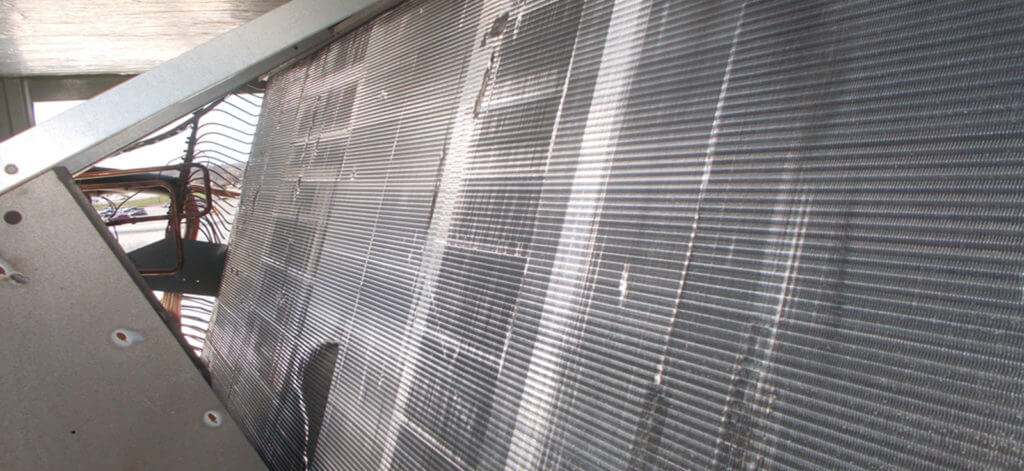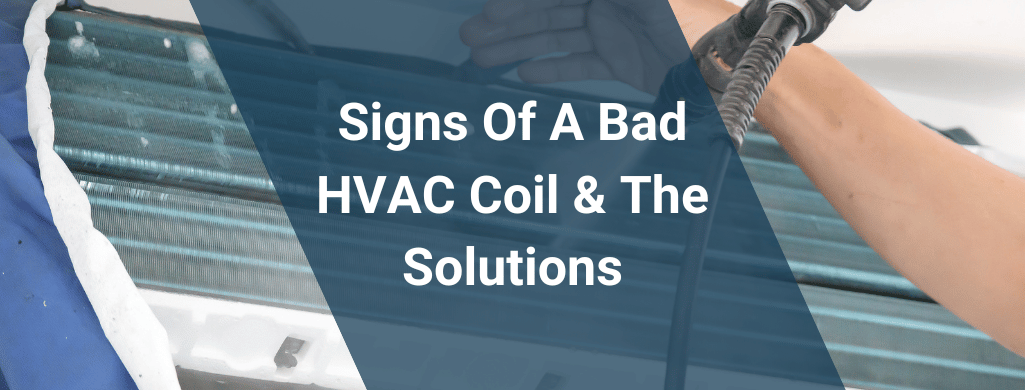An HVAC coil is one of the key components of an HVAC system and is vital to the cooling process. We have repaired a variety of commercial HVAC coils and units for hospitals, schools, and a variety of businesses. Many businesses and organizations with large facilities do not realize that they might have damaged AC coils or what an ac coil even looks like. But if a bad AC coil isn’t dealt with right away, it can lead to serious costly breakdowns for your facility.
We want to help you determine the signs and symptoms of a bad evaporator coil and share 8 steps to clean and repair your evaporator coil. We provide professional AC coil repair services.
What Does An AC Coil Look Like?
In order to check your evaporator coil, you have to know what you are looking for. An AC coil looks like a metal mesh. It consists of thin lines of metal typically going up and down. View our image below of an AC coil to know what it looks like. While this is a cleaned AC coil and a large commercial AC coil, some AC coils can be part of units that are a cube with a fan in the center or a pyramid shape in appearance.

Signs Of A Bad AC Coil or Broken Evaporator Coil
Below are the common signs or symptoms of a bad AC coil and the solutions to fix the HVAC coil issues.
- Air conditioning is warm or there are hot and cool spots.
- Cooling system is making banging noises.
- Air conditioning refuses to turn on.
- Fluids like oils or refrigerant are leaked in or around HVAC unit.
- Air conditioning runs frequently but does not seem to produce desired results.
Get your commercial AC serviced by PROAC. We will take care of any evaporator coil problem your business has.
Below is a more detailed breakdown of the signs and symptoms of a bad ac coil.
1. Your Company’s Air Conditioning Is Not Working
This is the most obvious sign of an evaporator coil being damaged and not functioning, but it can be a range of reasons beyond even the HVAC coil being broken. Everything from your HVAC coil leaking fluids to it being damaged and inoperable
2. Your HVAC System & Coil Is Leaking
You can typically identify a coil leak by oil on the U-tube or pan or simply around the coil. A leaking coil needs to be fixed in order for it to become operable again. Another indicator for leaks from your HVAC system is water stains in ceiling tiles or, specifically, pooling water near the air handler.
Water and moisture buildup is one of the major problems with HVAC cooling and heating systems. It can lead to mold that needs to be removed, rust, and an HVAC system that does not function properly. Water can also be a key indicator of issues with your HVAC system and damaged AC coils. A poorly insulated air handler can lead to condensation build up, and that condensation will reveal itself in the diffusers in the ceiling.
3. HVAC Coil Become Fouled
Your HVAC Coil can build up with dirt and grime that keeps it from being operable. This grime can hold moisture around the coil leading to rust and degradation of the entire coil system. If your building is close to a highway sprayed with salt, it can get on your HVAC coils and lead to them rusting and deteriorating very quickly.
4. Blocked Or Frozen Evaporator Coil
A frozen evaporator coil is typically caused by weak airflow. Essentially the system is doing its job, but the air is not moving correctly through the unit. This can be caused by restricted airflow in the ductwork. Which means your ductwork needs to be cleaned in order for your HVAC system to work properly.
It can also be caused by dirt build up in other areas of the HVAC system. We often find the issue after we thaw the frozen evaporator coil. A blocked condenser coil does not function properly. That is why it is so important to clean your AC unit.
5. Crimped Evaporator Coil
If the evaporator coil is damaged and crimped, it does not allow airflow through the system, and it will not effectively cool the air. Just like a condenser coil that is blocked by dirt, your crimped coil is blocking the air flow and functionality of your ac system. Or it will cool the air that is present and cause the evaporator coil to freeze. Repair your evaporator coil with a fin comb to allow the coil to work effectively again.
How To Check For Evaporator Coil Problems
Learn how to check your evaporator coil and be sure to check your evaporator coil annually at minimum. Checking your evaporator coil to see if you have a bad ac coil isn’t as complicated as it sounds.
- Step 1: Make sure all power to the unit is turned off.
- Step 2: Remove the access panel on the air handler unit.
- Step 3: Look at the AC coil for the signs and symptoms of a bad evaporator coil listed above.
Once this is complete, you can inspect the evaporator coils and diagnose the problem. This should give you a good idea of the condition of your coils, and if you notice problems here, there is a chance that issues could be found in other parts of the ac system as well. Now you can confidently know how to check your evaporator coil for issues and address them before they get worse.
Dirty AC Coil Symptoms
Many AC coils that do not get proper maintenance and cleaning become dirty. That dirt blocks airflow in the AC unit. One of the most common symptoms of a dirty and bad AC unit is a frozen AC coil. because of the dirt build up in the ac coil it blocks airflow and the cold air gets built up and eventually freezes.
How To Repair Your AC Coil
Your AC unit coil repair can be managed by us. We have the professional knowledge and experience to repair your AC coil unit professionally and effectively. Contact us for AC evaporator coil repair and for hospital AC coil cleaning.
Contact PROAC To Repair, Maintenance & Clean Your Evaporator Coil
Looking for the symptoms of a bad evaporator is important to understanding the condition of your ac system, but this is only a reactive approach. Preventative maintenance on your evaporator coil and the entire heating and cooling system will lead to the longevity you desire from your HVAC system, and can let you know that you have bad ac coils before a system breakdown makes it apparent. An HVAC system for a hospital, school, or manufacturing facility is expensive to replace. Make sure yours is getting attention and regular maintenance so it can last longer. If you have a bad evaporator coil and need repairs you can trust, contact PROAC for commercial HVAC cleaning services and HVAC maintenance or HVAC repair. We are located in Central Pennsylvania and serve a range of states on the East Coast. We can’t wait to get your bad evaporator coil up and running and keep your facility operating at its best.

